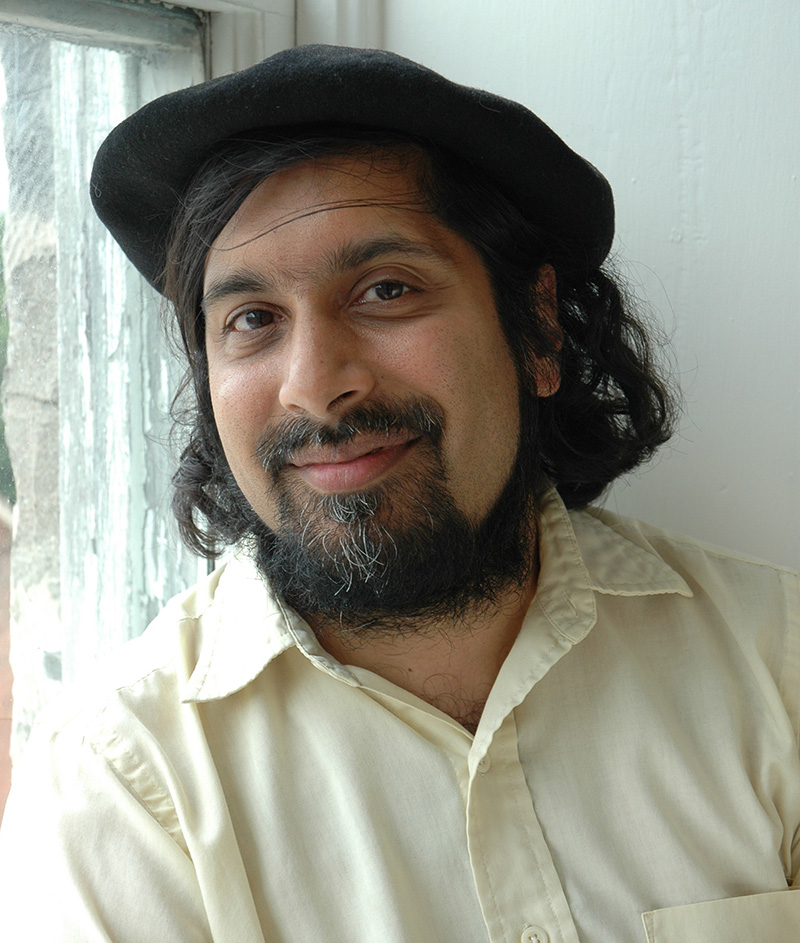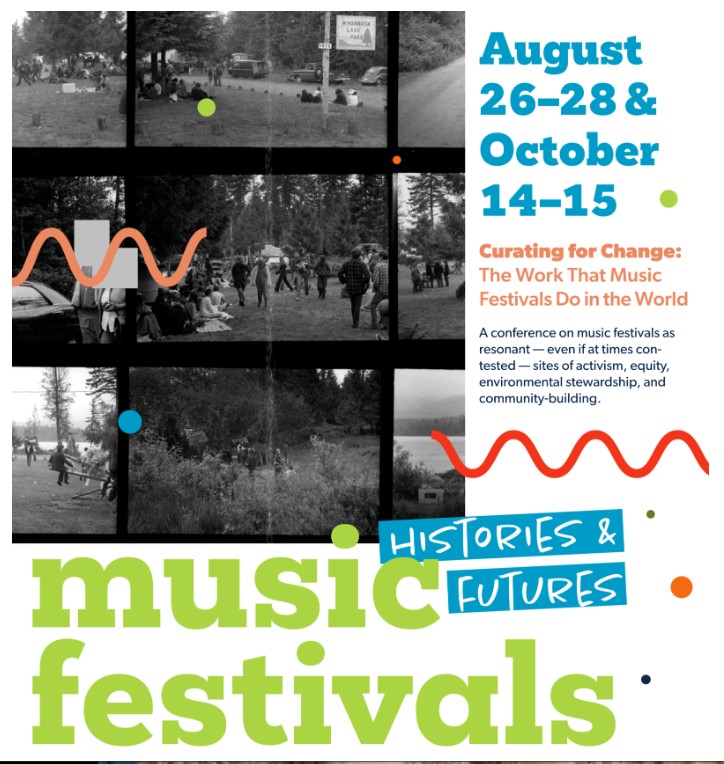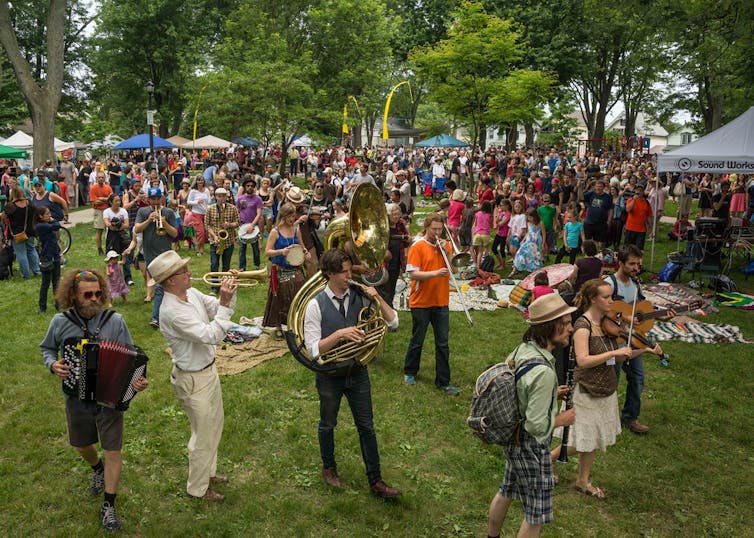By Prof. Eric Fillion, Buchanan Postdoctoral Fellow in Canadian History, Queen’s University; and Dr. Ajay Heble, School of English and Theatre Studies, University of Guelph
This article is republished from The Conversation Canada under a Creative Commons licence. Read the original article.
Music festival season is finally here. And after multiple summers without large in-person gatherings and reduced capacities, many people are returning to their favourite music festivals to have a good time.
But these gatherings, especially independent and artist-run music festivals, do more than entertain. They can also offer solutions to some of the social, political and ecological challenges we face today and that await us in the future.

During the early days of the COVID-19 pandemic, sociomusicologist Simon Frith reflected on the impact of lockdowns for festivals. He said music festivals should reflect changes in society and instead of “despairing that our favourite festivals may never happen again in the ways that we’ve got used to, we should be looking forward to new festivals happening in new ways.”
His invitation to think imaginatively about festivals prompted us to ask questions about the meaning of festivals: what is the work that music festivals do? Can independent and artist-run music festivals make a difference in the world? Can they impact actual changes in people’s behaviours, government policies and global institutions?
Lofty questions as we head out the door to enjoy some music? We don’t think so. To help us tackle these questions, we organized a conference about music festivals and had conversations with scholars, practitioners, artists, organizers and festival-goers who shared their insights about curating, programming and imagining music festivals.
Our question about the work music festivals do riffs on writing by literature scholar Doris Sommer. In her book, The Work of Art in the World, she encourages readers to trace the “ripple effects” of the arts into our daily institutions and practices. She asks readers to think about ways to “test, stretch and refine” how we teach, learn and curate.
Simply put, what does it mean to curate for change?
The roots of the verb “curate” offer an important clue here. Curation is linked with the word “cure.” And that gives us a sense of what’s at stake in the work that festivals can do in the world. Curation is derived from the 14th century Middle English curacioun, “curing of disease, restoration to health,” or from the Latin curationem, “taking care, attention, management.”
Curating a festival means bringing together an often unpredictable set of social engagements to hopefully foster an awareness of each other and a desire to care for the world around us. The act of curation can energize participation in the cultural public sphere.
Staging diversity, challenging power

Festivals are more than what is programmed, however. Music festivals are important not only in terms of programming matters, but also as forms of community-based education and activism.
In other words, festivals can build alternative visions of social co-operation and can question static relations of power and taken-for-granted representations. They can also address issues of environmental sustainability.
For example, British Columbia’s Aldergrove Beach Rock Festival, Canada’s first outdoor rock festival, held three months before the now-mythical Woodstock Music and Art Fair of 1969, featured mostly local artists, offering young idealists an experience of community and the opportunity to imagine a more peaceful future to the beat of the counterculture.
Another example, the Guelph Jazz Festival, launched in 1994, aims to reinvigorate public life with the spirit of dialogue and community. The festival programmers encourage audiences to see and hear the world anew through its colloquium and street wandering fanfares. And, like its more recent counterpart, IF Festival, it has helped stage diversity and recast the histories and identities of diverse, and often marginalized, peoples.
Music festivals are also joining the fight against climate change by taking their cues from organizations such as Creative Green Tools and Music Declares Emergency that seek to help the cultural sector reduce its carbon footprint.
For example, Westben, which holds summer and fall festivals near Campbellford, Ont., strives for sustainability through initiatives that range from bike advocacy to waste management to outdoor performances that improvise with the natural landscape.
Everyday utopias

While it may be tempting to think about festivals as an escape from everyday life, we also see them as transformative possibilities for society.
We are drawn to legal scholar Davina Cooper’s notion of everyday utopias. “Everyday utopias,” she writes, “don’t place their energy on pressuring mainstream institutions to change, on winning votes, or on taking over dominant social structures. Rather they work by creating the change they wish to encounter.”
The transformative potential of music festivals brings to mind the 1987 Utopia Festivals Conference, named after the small town of Utopia north of Toronto where it was held; but the choice of location was also deliberate.
In the closing days of the Cold War and amid the disruptions caused by neo-liberalism, the programmers and participants were, like us, trying to envision a better future — with music as a driving force.
As we continue to navigate our way out of the pandemic, we are inspired by those intentions. We believe the history of music festival culture can teach us much about both the limits and possibilities of music curating. We believe music festivals have the potential to position us to better understand, and perhaps even fight, racialized violence, ecological degradations, human rights violations and threats to democratic governance.
Can mainstream events such as Coachella and Glastonbury learn from their smaller, independent counterparts?
These ideas are worth keeping in mind as we head out to take in what this glorious music festival season has to offer.
The Conversation Canada is always seeking new academic contributors. University of Guelph researchers wishing to write articles should contact the U of G News Service.
